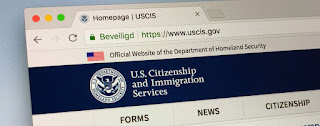On July 13, 2018, the United States Citizenship and Immigration Services (USCIS) published Policy Memorandum (PM)-602-0163, titled “Issuance of Certain RFEs and NOIDs; Revisions to Adjudicator's Field Manual (AFM) Chapter 10.5(a), Chapter 10.5(b)” [
PDF version]. In the decision, the USCIS changed its policy on when adjudicators may deny an application, petition, or request without first issuing a Request for Evidence (RFE) or a Notice of Intent to Deny (NOID). To learn about the new rules, please see our full article on the Policy Memorandum [
see article]. In this blog post, I will explain why I think that the Policy Memorandum directs the implementation of a bad policy that will increase the discretion of bureaucrats to make poorly-reasoned decisions at the expense of those making filings with the USCIS. If you are not familiar with the policy, please make sure to read our full article first.
My View of the Policy
As an initial matter, the USCIS's reasoning for rescinding its 2013 was lacking. The USCIS took the position that its 2013 policy — which instructed adjudicators to only deny without first issuing an RFE фс when there was “no possibility” that the submission of additional evidence could cure the deficiency in the application, petition, or request — conflicted with regulatory provision at 8 C.F.R. 103.2(b)(8). That regulation provides that adjudicators have the discretion to either deny a petition or to issue an RFE or NOID, when appropriate. The USCIS's new Policy Memorandum asserts that the 2013 policy unduly limited the discretion of adjudicators to deny applications, petitions, and requests without issuing an RFA or NOID.
While 8 C.F.R. 103.2(b)(8) does give adjudicators the discretion to deny an application, petition, or request, I disagree with the USCIS's conclusion that the 2013 rule was unduly restrictive. Nothing in the regulation precluded the USCIS from providing binding guidance to adjudicators on how to exercise their discretion with regard to when they can deny a petition without first issuing an RFE or NOID. Furthermore, the guidance provided by the 2013 rule was reasonable. In cases where it was possible that the submission of additional evidence would cure a deficiency, the rule instructed adjudicators to issue an RFE. In cases where there was no possibility that any submissions would cure the evidentiary deficiency, the rule instructed adjudicators to deny the application, petition, or request outright. In any event, although in its new Policy Memorandum the USCIS seeks to disguise its administrative preference as something that was prompted by a regulation, a careful reading of 8 C.F.R. 103.2(b)(8), copied below for your convenience, reveals that the regulation in no way precluded the USCIS's 2013 guidance [
see here].
Even if the USCIS's position on the proper reading of 8 C.F.R. 103.2(b)(8) was persuasive, its remedy does not constitute good policy.
The USCIS states that its objective, in addition to bringing its policies into accord with the applicable regulations, is to “discourage frivolous or substantially incomplete filings used as 'placeholder' filings and encourage applicants, petitioners, and requestors to be diligent in collecting or submitting required evidence.” The USCIS's targeting of “frivolous or substantially incomplete filings” in theory thereby excludes filings that are neither of those things but that are nevertheless not approvable based on the initial submission of evidence. The USCIS states in the Policy Memorandum that the new policy “is not intended to penalize filers for innocent mistakes or misunderstandings of evidentiary requirements.” Unfortunately, I fear that the Policy Memorandum itself was not written with the rigor to protect applicants, petitioners, and requestors whose petitions are not approvable due to the subjective determination that evidentiary omissions are not “innocent mistakes or misunderstandings of evidentiary requirements.”
The main policy change articulated in the Policy Memorandum deals with “denials based on lack of sufficient initial evidence.” These are the cases where the 2013 policy precluded denials without issuance of an RFE or NOID except in cases in which there was “no possibility” that the submission of additional evidence would cure the evidentiary defect primarily adhered. Considering that the USCIS stated that its policy is not designed to penalize filers for “innocent mistakes or misunderstandings of evidentiary requirements,” one would assume that the USCIS would provide detailed guidance for adjudicators in order to minimize the likelihood of denials without an RFE on that basis. Unfortunately, the USCIS failed to provide such guidance.
The Policy Memorandum states: “If all required initial evidence is not submitted with the benefit request, USCIS in its discretion may deny the benefit request for failure to establish eligibility based on lack of required initial evidence.” Here, we see no explicit or implicit limiting principle on when a denial without an RFE or NOID is appropriate. The Policy Memorandum provides two examples in the Policy Memorandum, but, unfortunately, this non-exhaustive list provides little in the way of the clarity that would be required to protect well-intentioned applicants, petitioners, and requestors.
The first example of a case in which the USCIS states that a denial without an RFE or NOID would be appropriate is where a “[w]aiver application [is] submitted with little to no supporting evidence.” While “no supporting evidence” is self-exclamatory, the USCIS offers nothing in the way of what constitutes “little … evidence.” This vague guidance will leave it up to each individual adjudicator to decide what the meaning of “little … evidence” is in the context of whether he or she should deny a waiver application that is not approvable based on the initial evidence. This is all the more disconcerting in light of the fact that each individual waiver application is unique, and thus the evidence required to support one waiver application is not necessarily the same in volume or complexity as the evidence required to support another.
The second example is where a specific document or form is required but is not part of the initial submission. It states that these documents may include those required by “the regulations, the statute, or form instructions…” Here, it is worth noting that many types of applications, petitions, and requests have demanding documentary requirements. While this example is somewhat more specific than the first, it makes it likely that applicants, petitioners, and requestors will be penalized for “innocent mistakes or misunderstandings of evidentiary requirements.”
The USCIS provides no further examples of cases in which it would be appropriate to deny an application or petition that were not already covered by the 2013 guidance. The result is a policy that, through lack of specificity, does not place meaningful restraints on adjudicators to achieve its stated objective of discouraging frivolous filings while not penalizing individuals for “innocent mistakes or misunderstandings of evidentiary requirements.”
There are two easily foreseeable unsavory outcomes for applicants, petitioners, and requestors that are likely to follow from the Policy Memorandum. First, the lack of clear guidance to adjudicators will create a system of inconsistent adjudications, where an individual adjudicator in one case applies a very different standard for determining whether to deny without issuance of an RFE or NOID than an adjudicator applies in another case. Second, despite the Policy Memorandum's conclusory representations to the contrary, it will open the floodgates for denials based on any number of reasons, including, I fear, adjudicative expediency. This second point will, unfortunately, lead to many good faith applicants, petitioners, and requestors having their filings subsumed in the ever-growing bureaucratic morass that constitutes our immigration system.
The Policy Memorandum, like many recent USCIS policies, increases the demands on applicants, petitioners, and requestors, as well as their attorneys, to make no mistakes in their filings. The stakes for many were further raised for many individuals when the USCIS issued a separate Memorandum modifying its Notice to Appear (NTA) issuance policies.
Regardless of USCIS's current policies, applicants, petitioners, petition beneficiaries, and requestors are strongly advised to consult with an experienced immigration attorney. An experienced attorney will be able to assess the individual case and provide expert guidance on the evidentiary and other filing requirements associated with a specific application, petition, or request, as well as any ancillary issues. The most likely way to succeed in what is becoming an increasingly difficult environment in dealing with the USCIS is to work to meet the high bar set by the new rules.
Please visit the
nyc immigration lawyers website for further information. The Law Offices of Grinberg & Segal, PLLC focuses vast segment of its practice on immigration law. This steadfast dedication has resulted in thousands of immigrants throughout the United States.














